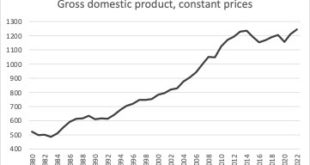New Working Paper published by the Political Economy Research Institute (PERI). From the abstract:Interest rates have declined over the last 40 years, a period of increasing inequality. The steady decline in interest rates has been interpreted by and large as resulting from a decline of the natural rate of interest. This paper surveys the main explanations associated with the notion of a decline in the natural rate of interest, including the savings glut and the secular stagnation...
Read More »Lula’s election and what lies ahead
It's been a while since I wrote about the Brazilian crisis (a summary of the previous catastrophic election here). In part that election and the continued crisis explains why I have written less, not just about Brazil. This has been a long economic depression that started in 2015 (see graph), with a coup in 2016 and since 2018 the added problem of a right-wing authoritarian regime that won an election that was only possible with the political proscription of Lula. But at least the political...
Read More »Comments on the history of the Review of Keynesian Economics on its tenth anniversary
By Thomas Palley This Fall (October/November 2022) marks the tenth anniversary of the founding of the Review of Keynesian Economics (ROKE). The founding co-editors were Louis-Philippe Rochon, Matias Vernengo, and I. At the beginning of 2018 Louis-Philippe Rochon stepped down to become sole editor of the Review of Political Economy and he was replaced by Esteban Pérez Caldentey.Since then, ROKE has further enhanced its reputation, becoming a leading heterodox economics journal as measured by...
Read More »Palley on the history of the Review of Keynesian Economics
Here a short video. I do offer a few remarks. I would add that Louis-Philippe was central not just in the initial discussions that we had going back two decades now, to when we were at Kalamazoo College, but in getting Elgar into the journal business. Not sure Elgar would have done that without LP convincing them. This happened at the time that the JPKE was transitioning from Paul Davidson editorship, to the Jan Kregel and Randy Wray period. [embedded content]I suggested Tom to LP, since he...
Read More »Some thoughts on radical environmentalism and heterodox economics
Ecological economics emerged in the 1970s, as a sub-field of mainstream economics, using some of the conventional tools of neoclassical economics, but trying to move away from it, not only regarding some of the theoretical choices, but also distancing from some of the ethical concerns of the mainstream (Holt and Spash, 2009). Even though there were precursors to ecological economics, in particular the work of Kenneth Boulding, Nicholas Georgescu-Roegen and Karl William Kapp, it is clear that...
Read More »Peter Temin on “Keynes, Then and Now”
This will be part of the 10 year anniversary of ROKE. Register here.
Read More »Beyond vulgar heterodox economics: a note on the legacy of Pierangelo Garegnani (1930-2011)
My paper, in Italian, which was a modified version of a talk last year, has been published in Moneta e Credito, and is available for download here.
Read More »Thinking about Inflation: A conversation with Marc Lavoie
[embedded content]The conversation on inflation with Marc Lavoie at the Fields Institute in Toronto. I think that there was an agreement, between us, and most people in the room that the oligopolistic view of inflation does not hold water. I tried to discuss the Argentinean case on the basis of a piece that I co-wrote with Fabián Amico and Franklin Serrano, published in the local version of Le Monde Diplomatique online. A longer version, also in Spanish, here. An English version is in the...
Read More »Lance Taylor (1940-2022) and his legacy
With Lance in Beijing (2001)I took Lance’s macro class in the Fall of 1995 at the New School for Social Research (NSSR), and then was his Teaching Assistant for two years. The book we formally used was Income Distribution, Inflation and Growth: Lectures on Structuralist Macroeconomic Theory, in which the terms (not the concepts) for wage-led and profit-led economies were first used (at least that's what I think; profit-led does not appear in the index, I must note). But classes were based on...
Read More »Modern Money Theory in the Tropics: A Reply to Agustin Mario
Our reply to a very inaccurate discussion of our views on MMT by Agustin Mario. From the abstract:This paper responds to some inaccuracies on the discussion of our views on Modern Money Theory (MMT), as discussed by Agustin Mario. We believe that while is correct in noting that autonomous spending generates taxes, and fiscal balances are a result, MMT authors overlook the difficulties in pursuing expansionary fiscal policy in the developing countries. These are limited by the existence of an...
Read More » Naked Keynesianism
Naked Keynesianism




